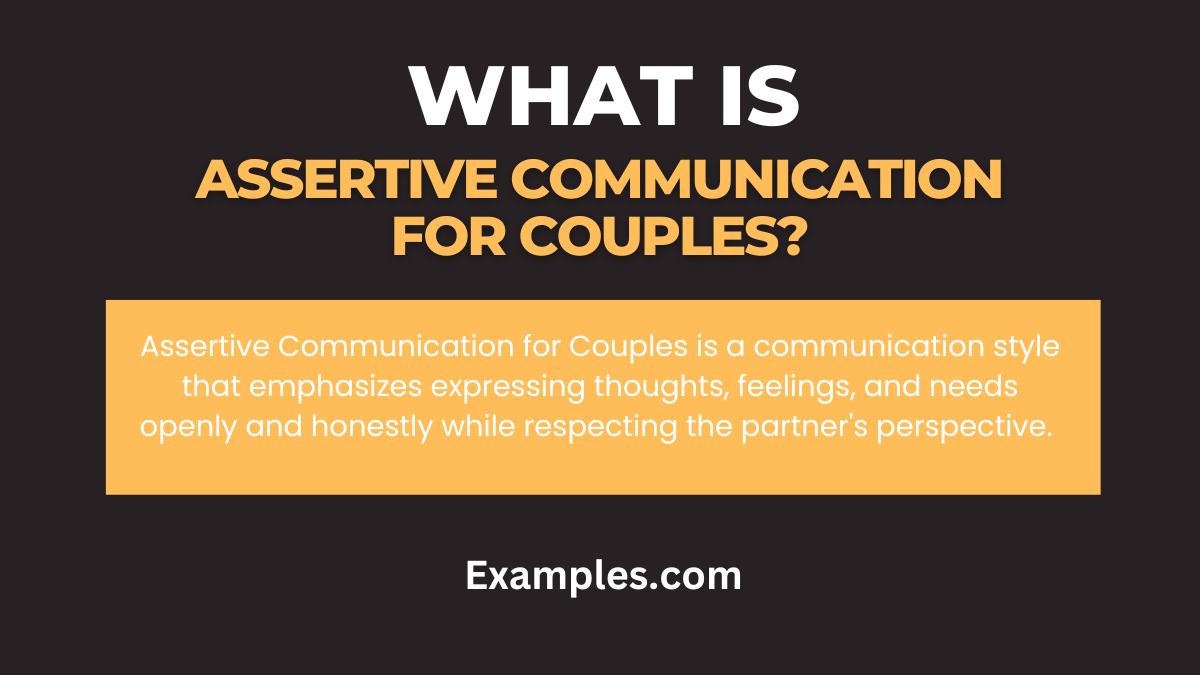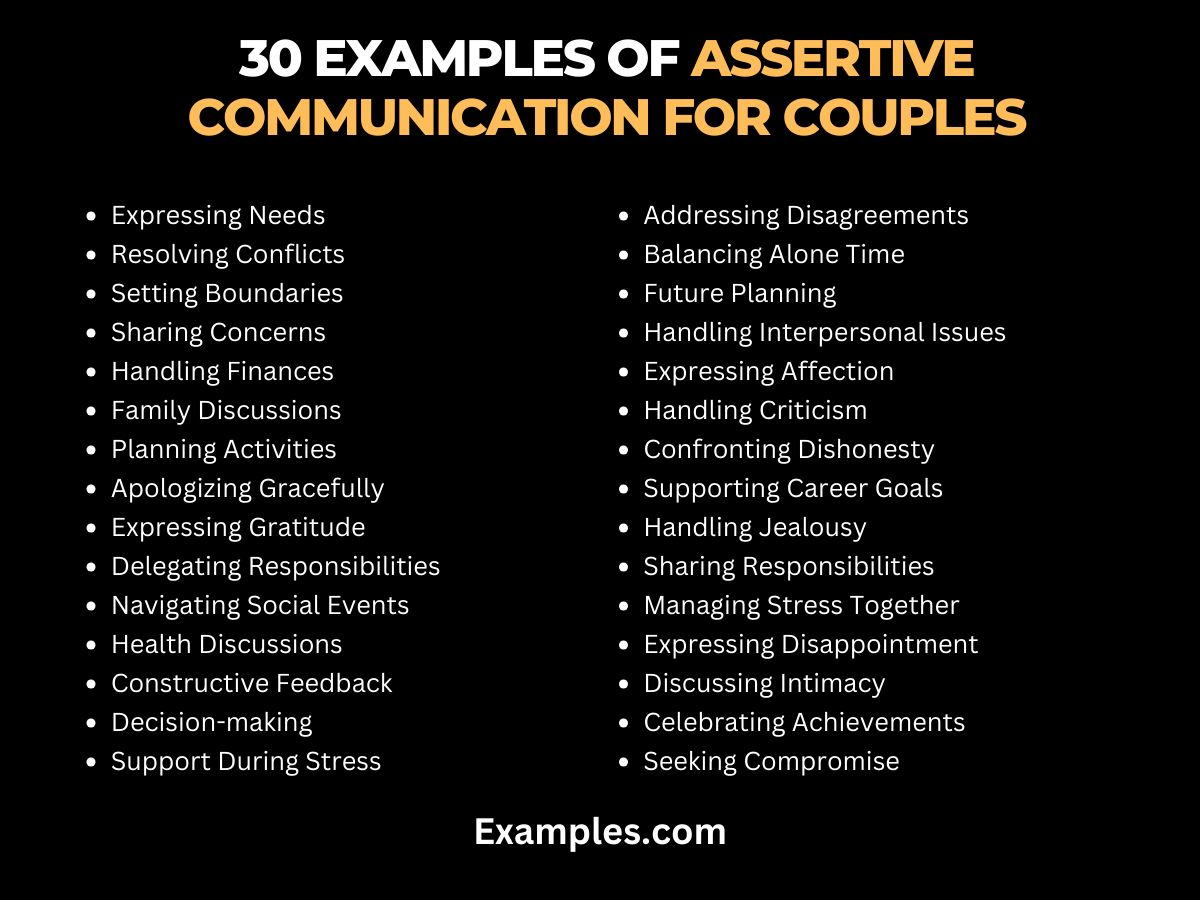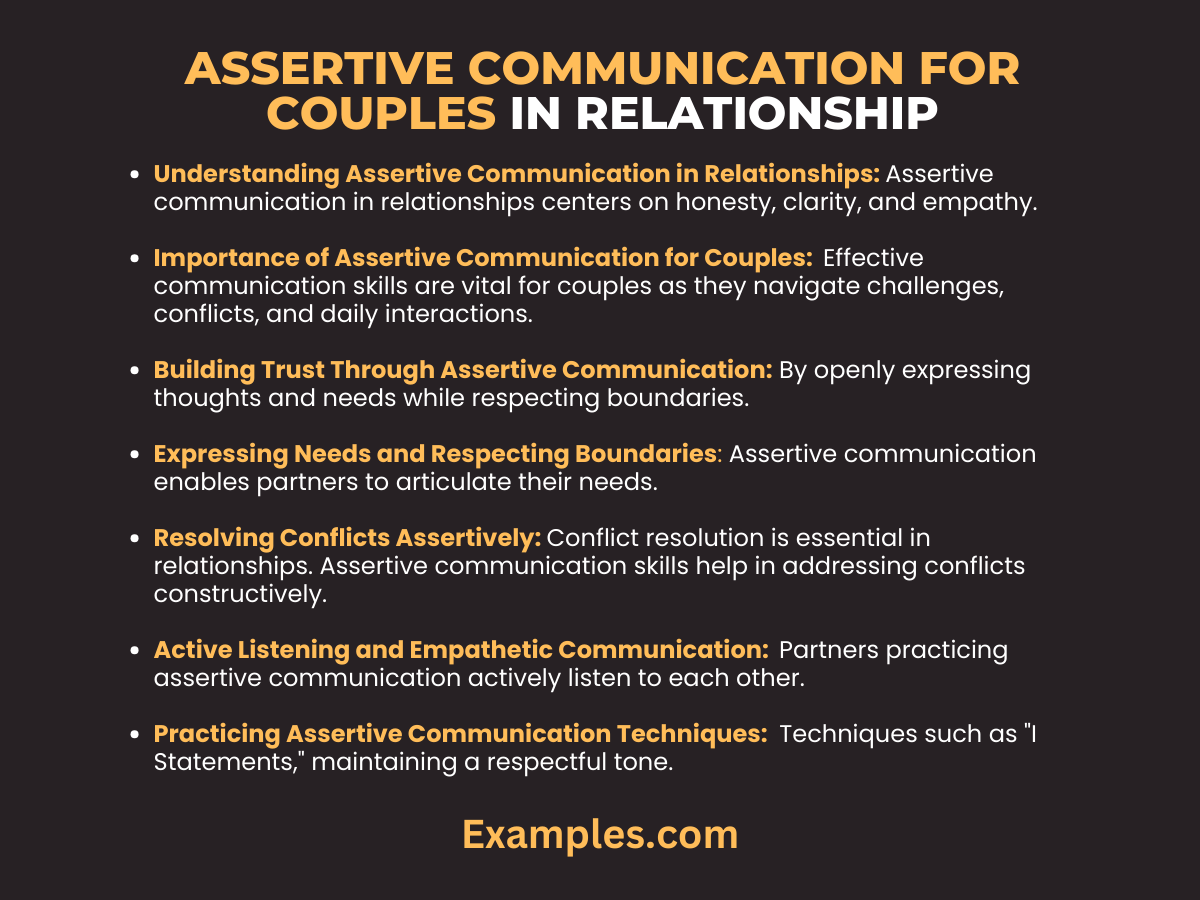Assertive Communication for Couples
Embark on a transformative journey with Assertive Communication for Couples, unraveling the definition, examples, and historical roots that shape this crucial skill in relationships. From understanding its origin to practical tips on implementation, explore how assertive communication can enhance connection and foster mutual understanding. Learn the art of expressing needs, resolving conflicts, and building a resilient partnership with actionable insights and valuable tips, creating a foundation for lasting love and effective communication.
What is Assertive Communication for Couples?

Assertive Communication for Couples is a communication style that emphasizes expressing thoughts, feelings, and needs openly and honestly while respecting the partner’s perspective. It involves clear and respectful expression, active listening, and the ability to navigate conflicts constructively. This approach fosters understanding, promotes healthy dialogue, and contributes to a stronger, more harmonious relationship dynamic.
30 Examples of Assertive Communication for Couples

Explore these impactful examples of Assertive Communication for Couples, offering practical insights into fostering healthy relationships. Each example showcases the art of expressing needs, resolving conflicts, and building trust through assertive communication, creating a foundation for lasting connection and understanding.
- Expressing Needs: Communicating the need for personal space without disregarding partner’s feelings, fostering individuality within the relationship.
- Resolving Conflicts: Addressing disagreements calmly, seeking solutions together rather than blaming each other for the issue.
- Setting Boundaries: Clearly defining boundaries regarding personal time or friendships, respecting each other’s limits to maintain trust.
- Sharing Concerns: Discussing worries or fears openly, creating a safe space for emotional support and reassurance.
- Handling Finances: Deciding on a budget collaboratively, ensuring mutual financial goals and responsibilities are acknowledged.
- Family Discussions: Having respectful conversations about family matters, balancing opinions and decisions together.
- Planning Activities: Voicing preferences for activities, considering each other’s interests for mutual enjoyment.
- Apologizing Gracefully: Offering sincere apologies for mistakes, acknowledging responsibility without shifting blame.
- Expressing Gratitude: Regularly showing appreciation for efforts or gestures, reinforcing positivity and mutual appreciation.
- Delegating Responsibilities: Discussing household tasks or responsibilities, ensuring an equitable distribution of chores.
- Navigating Social Events: Communicating comfort levels in social gatherings, accommodating each other’s preferences.
- Health Discussions: Openly discussing health concerns, offering support and encouragement for well-being.
- Constructive Feedback: Offering feedback constructively, focusing on improvement rather than criticism.
- Decision-making: Collaborating on important decisions, considering both perspectives for mutual agreement.
- Support During Stress: Communicating needs for support during stressful times, fostering empathy and understanding.
- Addressing Disagreements: Approaching disagreements respectfully, seeking compromise rather than winning arguments.
- Balancing Alone Time: Discussing the need for personal time, ensuring it doesn’t affect the relationship negatively.
- Future Planning: Sharing aspirations and goals, aligning future plans for mutual growth and understanding.
- Handling Interpersonal Issues: Addressing issues with in-laws or friends, ensuring a united front and mutual respect.
- Expressing Affection: Communicating affection openly and genuinely, strengthening emotional bonds.
- Handling Criticism: Receiving criticism without defensiveness, acknowledging room for improvement.
- Confronting Dishonesty: Discussing trust issues calmly, aiming for transparency and resolution.
- Supporting Career Goals: Communicating career aspirations, seeking support and understanding from each other.
- Handling Jealousy: Discussing feelings of jealousy, addressing insecurities with empathy and reassurance.
- Sharing Responsibilities: Discussing parenting or pet responsibilities, ensuring mutual involvement and support.
- Managing Stress Together: Sharing stressors and coping mechanisms, providing mutual comfort and support.
- Expressing Disappointment: Addressing letdowns without blame, expressing emotions openly and constructively.
- Discussing Intimacy: Addressing intimacy concerns respectfully, fostering a safe space for open communication.
- Celebrating Achievements: Acknowledging each other’s successes, promoting mutual encouragement and pride.
- Seeking Compromise: Working together to find middle ground in disagreements, valuing the relationship over individual differences.
Assertive Communication for Couples in Relationship

Assertive communication in relationships is a cornerstone for fostering mutual respect, understanding, and harmony between partners. It revolves around expressing thoughts, needs, and emotions openly while valuing the perspective of your significant other. Here’s a detailed guide on harnessing assertive communication skills to strengthen your relationship:
Understanding Assertive Communication in Relationships: Assertive communication in relationships centers on honesty, clarity, and empathy. It involves expressing thoughts and feelings directly while acknowledging and respecting the partner’s emotions and opinions. This approach fosters an environment of trust and mutual understanding, nurturing a healthier bond.
Importance of Assertive Communication for Couples: Effective communication skills are vital for couples as they navigate challenges, conflicts, and daily interactions. Assertive communication allows partners to express themselves authentically, fostering a deeper connection and creating a supportive environment for growth and understanding.
Building Trust Through Assertive Communication: By openly expressing thoughts and needs while respecting boundaries, couples establish a foundation of trust. Honesty, directness, and consistent communication contribute to a sense of security and emotional intimacy in the relationship.
Expressing Needs and Respecting Boundaries: Assertive communication enables partners to articulate their needs, whether it’s personal space, emotional support, or specific boundaries. Mutual respect for each other’s boundaries fosters a relationship built on understanding and consideration.
Resolving Conflicts Assertively: Conflict resolution is essential in relationships. Assertive communication skills help in addressing conflicts constructively, focusing on finding solutions rather than placing blame. This approach encourages collaborative problem-solving and strengthens the partnership.
Active Listening and Empathetic Communication: Partners practicing assertive communication actively listen to each other, valuing the other’s perspective without judgment. Empathetic communication fosters deeper connections by understanding and validating each other’s feelings and experiences.
Practicing Assertive Communication Techniques: Techniques such as “I Statements,” maintaining a respectful tone, and offering constructive feedback are integral to assertive communication in relationships. These tools promote clarity, understanding, and a positive atmosphere for communication.
Cultivating Mutual Respect and Understanding: Assertive communication encourages mutual respect by acknowledging differences, handling disagreements respectfully, and nurturing an environment where both partners feel valued and understood.
Implementing Assertive Communication Exercises: Engaging in assertive communication exercises, such as role-playing scenarios or active communication worksheets, strengthens communication skills and enhances understanding between partners.
Assertive Communication Trusting for Couples
In a relationship, trust forms the bedrock upon which intimacy and connection thrive. Assertive communication, when intertwined with trust, becomes a potent force for couples seeking a deeper understanding and strengthened bonds. Let’s delve into the dynamics of assertive communication within the context of trust, exploring how these two elements can harmoniously coexist to create a resilient and flourishing partnership.
1. The Intersection of Trust and Assertive Communication: Trust and assertive communication are symbiotic in nature. Building trust involves transparency, and assertive communication provides the platform for transparent expression. It’s a delicate dance where partners openly share thoughts and feelings, fostering an environment where trust can grow organically.
2. Transparency in Expressing Needs and Desires: Assertive communication allows couples to communicate needs and desires openly, creating a space where partners feel safe to express themselves authentically. This transparency is a crucial component of trust, as it eliminates ambiguity and promotes an understanding of each other’s emotional landscapes.
3. Navigating Vulnerability with Assertiveness: Trusting relationships are forged through vulnerability, and assertive communication provides the tools to navigate this vulnerability. Partners can openly discuss fears, insecurities, and concerns with the assurance that their assertive expressions will be met with empathy and understanding.
4. Resolving Conflicts through Assertiveness without Eroding Trust: Conflicts are inevitable in any relationship. Assertive communication ensures that conflicts are addressed constructively, without jeopardizing the foundation of trust. By expressing concerns openly and respectfully, couples can resolve issues while strengthening their trust in each other’s commitment to growth and understanding.
5. Establishing Boundaries and Honoring Commitments: Trust flourishes in an environment where boundaries are clear and respected. Assertive communication enables couples to establish and communicate their boundaries effectively. This clarity ensures that commitments are honored, further solidifying the foundation of trust within the relationship.
6. Emotional Safety through Assertive Expression: In a trusting relationship, partners feel emotionally safe. Assertive communication contributes to this safety net by allowing individuals to express their emotions without fear of judgment. This emotional safety enhances trust as partners learn to rely on each other for support and understanding.
How Can Couples Build on Their Assertive Communication?
Effective communication is the lifeblood of a thriving relationship, and assertive communication forms the bedrock of healthy interpersonal dynamics. Building and refining assertive communication skills is essential for couples to foster understanding, resolve conflicts, and strengthen their bond. Here’s a comprehensive guide on how couples can enhance their assertive communication:
- Prioritize Active Listening: Cultivate the habit of active listening to understand your partner’s perspective genuinely. This involves giving full attention, acknowledging emotions, and responding appropriately.
- Practice Clear Expression: Encourage clarity in communication by expressing thoughts and feelings directly and unambiguously. Avoid assumptions and articulate your needs and expectations clearly.
- Embrace “I Statements”: Utilize “I statements” to express personal feelings, thoughts, and needs without attributing blame. This encourages ownership of emotions and fosters an empathetic response from your partner.
- Maintain a Respectful Tone: Tone plays a crucial role in communication. Ensure your tone is respectful, avoiding sarcasm or aggression. A respectful tone fosters a positive atmosphere for open dialogue.
- Cultivate Empathy: Develop empathy by putting yourself in your partner’s shoes. Understand their feelings, validate their experiences, and respond with compassion and understanding.
- Utilize Positive Body Language: Non-verbal cues are powerful in communication. Use positive body language to convey openness, attentiveness, and sincerity, reinforcing your verbal messages.
- Exercise Emotional Control: Learn to manage emotions effectively during discussions. Avoid reacting impulsively and instead respond with composure, allowing for more constructive conversations.
- Offer Constructive Feedback: When providing feedback, ensure it is constructive and solution-oriented. Frame suggestions positively, focusing on improvement rather than criticism.
Why are Assertive Communication Exercises for Couples Important?
Effective communication is the cornerstone of a healthy relationship, and assertive communication exercises for couples play a pivotal role in enhancing this vital skill set. Here’s a comprehensive guide outlining the significance of incorporating assertive communication exercises into a couple’s routine:
- Fostering Understanding: Assertive communication exercises promote a deeper understanding between partners by encouraging them to express their thoughts, feelings, and needs openly. This fosters empathy, laying the foundation for a more compassionate and harmonious relationship.
- Building Trust: Trust is fundamental in any relationship. Assertive communication exercises provide a structured platform for couples to communicate honestly and transparently, contributing to the development and reinforcement of trust.
- Resolving Conflicts Constructively: Couples often face conflicts, but assertive communication exercises equip partners with the tools to navigate disagreements constructively. By promoting respectful dialogue, these exercises pave the way for healthier conflict resolution.
- Enhancing Emotional Intimacy: Emotional intimacy thrives on open and honest communication. Assertive communication exercises enable couples to share their vulnerabilities, desires, and fears, creating a deeper emotional connection.
- Encouraging Mutual Growth: Couples who engage in assertive communication exercises actively participate in each other’s personal and relational growth. These exercises provide opportunities for feedback, constructive criticism, and support, fostering mutual development.
- Promoting Active Listening: Effective communication is a two-way street, and assertive communication exercises emphasize active listening. Partners learn to listen empathetically, fostering a deeper connection and understanding of each other’s perspectives.
- Preventing Misunderstandings: Misunderstandings can strain relationships. Assertive communication exercises teach couples to clarify and validate each other’s thoughts, reducing the likelihood of misinterpretations and fostering clear communication.
- Empowering Individuality: Assertive communication exercises encourage individuals to express their needs and boundaries, fostering a sense of autonomy within the relationship. This empowerment contributes to the overall well-being of each partner.
- Improving Problem-Solving Skills: Relationships inevitably face challenges. Engaging in assertive communication exercises equips couples with effective problem-solving skills, ensuring they approach difficulties collaboratively and find mutually beneficial solutions.
- Creating a Positive Atmosphere: Regular practice of assertive communication exercises contributes to a positive and open atmosphere within the relationship. Partners feel more comfortable expressing themselves, leading to a supportive and uplifting environment.
In conclusion, assertive communication is a transformative tool for couples, enabling them to navigate the complexities of their relationship with respect and understanding. By embracing this communication style, couples can effectively express their thoughts, feelings, and needs, while also valuing their partner’s perspective. This balance fosters a harmonious and strong relationship, where both individuals feel heard and respected.
Moreover, assertive communication in relationships extends beyond resolving conflicts. It plays a vital role in building trust, deepening emotional connections, and promoting mutual growth. When couples communicate assertively, they lay the foundation for a resilient partnership, characterized by clear understanding and mutual respect.
For further reading on the benefits of assertive communication in relationships, consider visiting the Mayo Clinic’s resource on “Reducing Stress through Assertive Communication.” Additionally, Psychology Today offers insightful tips on “Communicating More Assertively in Relationships,” which can be beneficial for couples looking to strengthen their communication skills.



